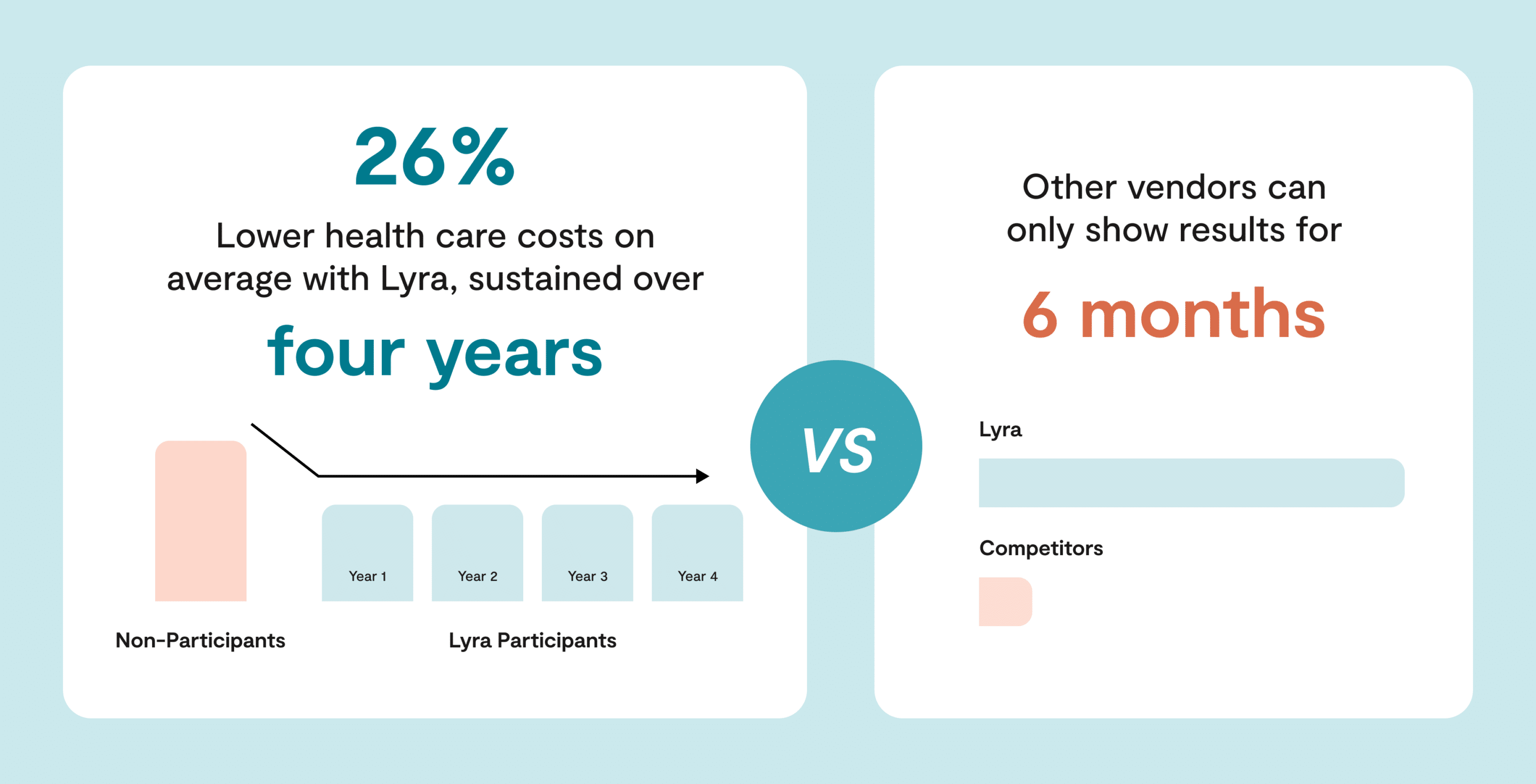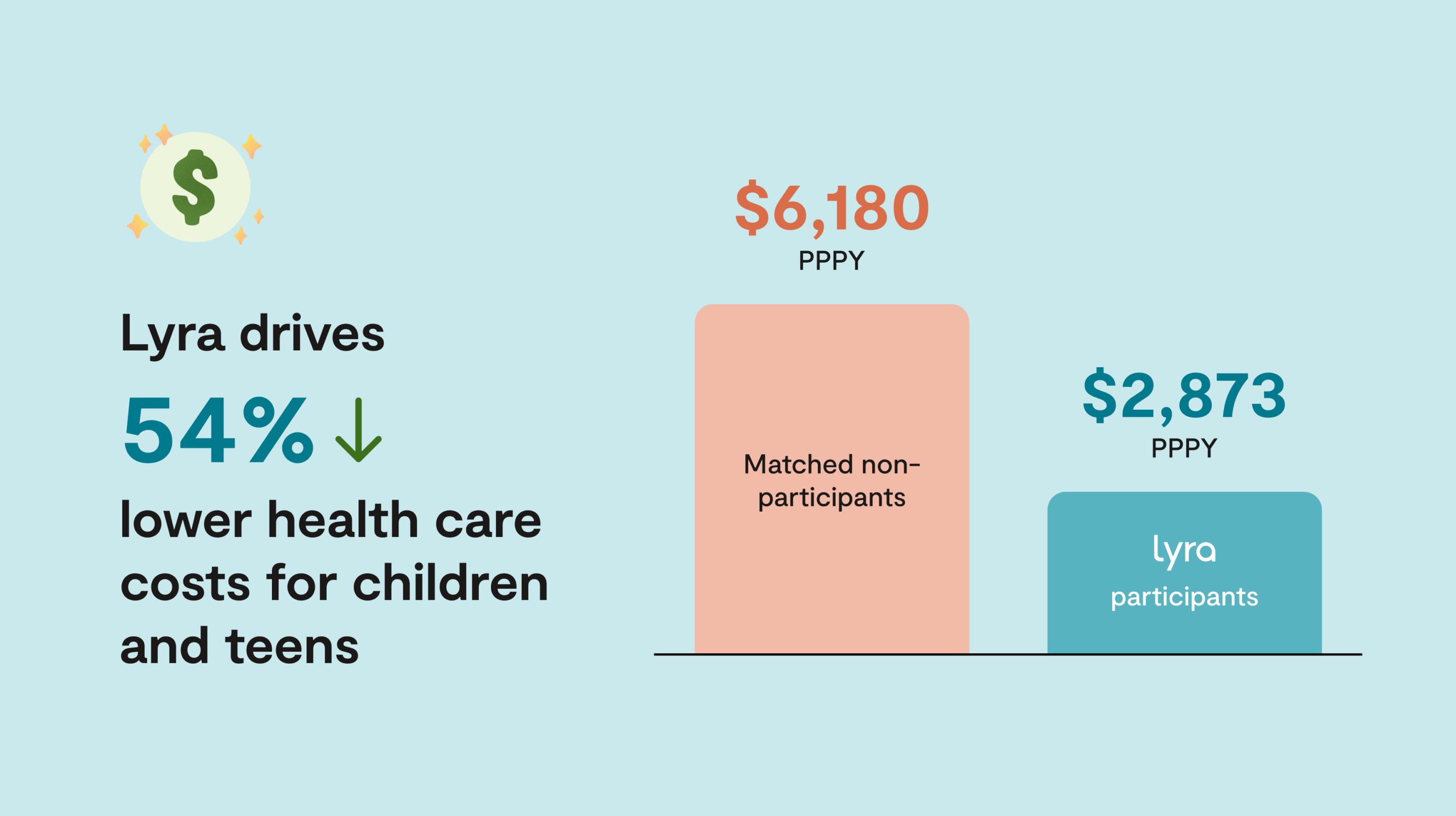Lyra Delivers the Best Value and Quality in Mental Health Care
May 15, 2024
As we commemorate Mental Health Awareness Month at Lyra Health, we’re also celebrating groundbreaking new research that proves what we’ve known from the start: Lyra’s world-leading outcomes deliver the best value in mental health care.
With this research, we set out to do something special—partnering with a third-party global professional services firm to conduct a first-of-its-kind, independent cost savings analysis.
What makes this analysis unique is that it not only evaluated the performance of Lyra’s mental health benefit for 30,000 members from manufacturing, consumer goods, and technology industries, but also evaluated health care cost savings across four consecutive years. This is the most ambitious study of its kind ever done. We looked at more data over more years, and conducted this study more scientifically than anything we’ve seen before.
We knew the results would be positive, but ultimately, they are unprecedented.
Researchers found that employers offering Lyra’s workforce mental health benefit experienced an average 26% reduction in annual health plan spending for participants over four years. Savings for children and teens in the study were even higher—a 54% reduction.

These results couldn’t come at a more critical time. Nearly 1 billion people worldwide are living with a mental health condition. Mental health care is reaching a tipping point around the globe, with the costs of poor mental health projected to reach $6 trillion globally by 2030.
Trends like these saddle employers with unique challenges. Unaddressed mental health needs lead to more work absences, higher turnover, lower productivity, and higher health care costs. As a result, mental health care is increasingly becoming a mainstay of employer-provided benefits, with 90% of employers in one survey reporting an increase in workforce mental health investment.
These research results demonstrate that investing in Lyra is paying off for employers in three big ways:
- Lyra delivers sustained health care cost savings over time.
- Lyra reduces emergency care spending, drug costs, and inpatient care costs.
- Lyra dramatically lowers health care spending for children and teens.
This is all possible because the care we deliver is more clinically effective. Better care with strong outcomes is more cost-effective over time than cheaper, less effective care.
Let’s take a closer look at the results.
Lyra delivers the only proven savings over several years
With this study’s results, Lyra is now the only mental health benefits provider to reduce year-over-year annual health care claims costs. In fact, Lyra lowered participants’ health care costs by an average of 26% per year, significantly reducing costs four years in a row. Similar studies by other mental health benefit providers relying on lower-quality care and lower-paid providers only show savings for six months. This is unsurprising since lower-quality care results in higher relapse rates and more care over time.

Workforce mental health advances when employees and their dependents can rapidly access excellent care. Unlike other mental health benefit providers who achieve a few months of clinical effect and extrapolate findings, Lyra’s four-year study from 2018 to 2021 includes all Lyra members—not just those presenting with a mental health diagnosis for the first time. This comprehensive, multi-year approach accounts for full, consistent seasonality to help benefits leaders budget with confidence.
The result? Your benefits dollars go further with Lyra and many more members get better, for longer.
Lyra prevents expensive and intensive interventions
By shifting care from their health plan to Lyra, employers save money year over year. Why? When organizations implement a comprehensive mental health benefit, more employees receive care and more costly, complex needs are addressed before expensive and intensive interventions are needed.
Several factors enabled the cost savings found in the study.
- The most significant factor included savings from outpatient mental health services shifting from employers’ medical plans to Lyra’s more cost-efficient, high-quality network.
- Lower inpatient mental health spending and lower emergency department usage drove more cost reductions.
- Even during the pandemic’s peak, Lyra members had remarkably lower prescription spending, saving 37% per year. They also needed fewer mental health prescriptions—think antidepressants or anxiety medications—despite having similar diagnoses as the matched non-participants.
Cost savings are supercharged for kids and teens
When one family member struggles with their mental health, everyone struggles. But there’s a profound ripple effect when someone’s life trajectory improves—it positively affects the lives of those around them, particularly when it comes to family mental health. That’s why Lyra is revolutionizing the way families access and manage mental health care with comprehensive, age-inclusive treatment options on a single, user-friendly platform.

This third-party, independent study reported that Lyra delivers the highest value for families, with 54% lower health care spending for children and teens. Our impact is greater for kids and teens because accessing care outside of Lyra is both harder and of more uneven quality than for adults, leading to avoidable and expensive complications. That's a savings of $3,307 per person, per year. In the study, all age groups showed lower claims spending, with the largest differences among members under 18. Lyra has an outsized impact on children by providing timely access—less than a day—to a network of over 6,500 child specialists. We offer the most comprehensive support for a range of mental health issues, from depression and anxiety to complex needs like eating disorders and suicidality in teens.
Proof positive: Lyra makes a difference
What sets Lyra apart is our ability to engage members with fast access to the highest-quality care. Our proven outcomes get more people better, at a lower cost of care. And, because high-cost claimants drive an outsized portion of behavioral health spend, our complex care and teen offerings—now available in all 50 states—are not only addressing intensive needs, but also helping reduce hospitalizations and medical spending.
With an investment in workforce mental health, Lyra’s customers see their employees (and their loved ones) get better faster. And, stay healthy longer.
This independent study reinforces that Lyra is the best mental health care benefit for your employees and their families. Our care helps workforces—and employers’ bottom lines—across industries more effectively than any other mental health provider.
Learn more about the Longitudinal Study
Author
Bob Kocher, MD
Co-Founder and President of Lyra Clinical Associates
Adjunct Professor of Medicine, Stanford University
Bob is the president of Lyra Clinical Associates, which works in partnership with Lyra Health to provide clinical services. He's an adjunct professor at Stanford University School of Medicine, senior fellow and advisory board member at the Leonard D. Schaeffer Center for Health Policy and Economics at USC, and guest scholar at the Brookings Institution. He serves on the advisory boards of Harvard Medical School Health Care Policy Department and National Institute of Healthcare Management. Bob served in the Obama Administration as special assistant to the president for healthcare and economic policy on the National Economic Council. In the Obama Administration, Bob was one of the shapers of the Affordable Care Act focusing on cost, quality, and delivery system reform and health IT policy.
Explore additional blogs

Lyra news
Introducing Lyra’s Center of Excellence for Neurodiversity

Lyra news
Announcing Lyra’s 2025 Workforce Mental Health Award Winners

Lyra news